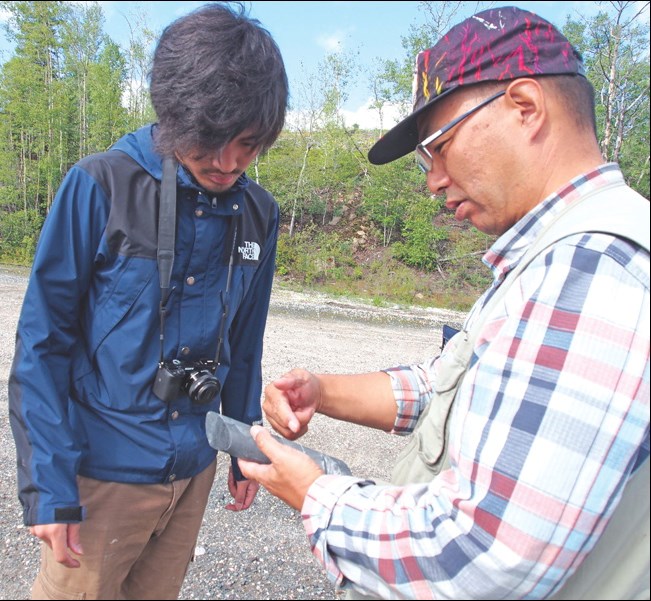In Flin Flon, Shoichi Kiyokawa can travel back in time.
An associate professor and field geologist at Kyushu University, Japan, Kiyokawa has travelled all over the world, from Egypt, to Ghana to Australia, studying the geology of regions that, like Flin Flon, were once the sites of ancient oceans.
By collecting and examining geological samples from different countries and different time periods, Kiyokawa gathers data about the chemistry and environmental conditions of these ancient bodies of water.
This month, Kiyokawa, joined by his student Kento Motomura, is studying the secrets buried deep within the area’s Precambrian rocks.
On this, his fourth visit to Flin Flon, Kiyokawa is comparing data from the Precambrian rock in the Flin Flon area, which dates from 1.8 to 1.9 billion years ago, to samples he gathered from a 3.2 billion year-old greenstone belt in Australia.
In order to gather this data, Kiyokawa studies core samples pulled from hundreds of metres below the surface. From these samples, the geologist cuts thin sections that can be studied with high-magnification optical and electron microscopes.
“At that time [3.2 billion years ago] the earth was completely different than modern conditions, because the oxygen level was very low,” Kiyokawa explained. “2.0 or 2.4 [billion years ago] the environment quickly changed and oxygenation started. At that time life – biogenic activities – were growing quickly and then the oceanic surface had a lot of organic matter that precipitated in the ocean.”
Kiyokawa said he has found, within Flin Flon-area core samples, dead materials from bacteria, mainly algae that lived at the ocean’s surface billions of years ago. He said he is able to distinguish between different life forms by examining carbon isotopes within the rock.
Through his research, Kiyokawa is able to gather a glimpse of life in the ancient world, a prospect which he finds thrilling: “To know what happened there – the only place we can see it is [in] the core,” Kiyokawa said with a smile.
While Kiyokawa mines information from the past, the application of his research is grounded in the modern world. By studying how living organisms have responded to atmospheric or environmental changes in past eras, scientists can better understand the possible outcomes of climate change in the present and future, and how major incidents, or gradual changes, affect life on earth.
Flin Flon: Research hub
While it might seem strange for a researcher from halfway across the world to target Flin Flon as a research destination, Kiyokawa says the area is famous among geologists, as it is one of very few places in the world where they can access Precambrian rocks that are 1.8 to 1.9 billion years old. Mining pollution over decades has left areas where vegetation has not regrown, leading to bare rock outcroppings at the surface that geologists can easily view and study.
Furthermore, Kiyokawa said Flin Flon’s mining infrastructure and legacy of geological research makes it much easier for him to gather essential data.
Kiyokawa has been able to access numerous core samples collected by Hudbay, saving him a great deal of time and research funds. The company has also allowed the researchers to use its core-logging facilities during the course of their visit.
In Flin Flon, Kiyokawa has also benefitted from the local expertise of a Hudbay retiree, geologist Dave Price, who has mapped much of the geology of the area. Price has helped Kiyokawa connect to the right resources – both human and natural – to maximize his research visits.
Price says Kiyokawa is one of hundreds, perhaps thousands, of visiting geologists whom he has guided around the area during his 46 years in Flin Flon.
“There have always been geologists interested [in the region], Price said. “What local people don’t realize is this is a tremendous geological classroom.”
While Kiyokawa will be leaving Flin Flon this week, his research, and that of other scientists like him, is building a name for the community as a small, but important piece in the big puzzle of the world’s geological history.




